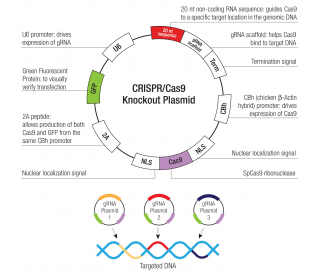Purity
>90%, by SDS-PAGE visualized with Silver Staining and quantitative densitometry by Coomassie® Blue Staining.
Endotoxin Level
<0.01 EU per 1 μg of the protein by the LAL method.
Activity
Measured by its ability to neutralize Activin-mediated erythroid differentiation of K562 human chronic myelogenous leukemia cells. The ED 50 for this effect is 0.1‑0.4 µg/mL in the presence of 7.5 ng/mL of rhActivin A.
Source
Spodoptera frugiperda, Sf 21 (baculovirus)-derived Gly30-Asp329, with an N-terminal Met
Accession #
N-terminal Sequence
AnalysisMet
Predicted Molecular Mass
31 kDa
SDS-PAGE
40 kDa, reducing conditions
Carrier Free
What does CF mean?
CF stands for Carrier Free (CF). We typically add Bovine Serum Albumin (BSA) as a carrier protein to our recombinant proteins. Adding a carrier protein enhances protein stability, increases shelf-life, and allows the recombinant protein to be stored at a more dilute concentration. The carrier free version does not contain BSA.
What formulation is right for me?
In general, we advise purchasing the recombinant protein with BSA for use in cell or tissue culture, or as an ELISA standard. In contrast, the carrier free protein is recommended for applications, in which the presence of BSA could interfere.
669-FO |
| 669-FO/CF |
Formulation Lyophilized from a 0.2 μm filtered solution in Acetonitrile and TFA with BSA as a carrier protein. | Formulation Lyophilized from a 0.2 μm filtered solution in Acetonitrile and TFA. | |
Reconstitution Reconstitute at 10 μg/mL in sterile PBS containing at least 0.1% human or bovine serum albumin. | Reconstitution Reconstitute at 100 μg/mL in sterile PBS. | |
Shipping The product is shipped at ambient temperature. Upon receipt, store it immediately at the temperature recommended below. | Shipping The product is shipped at ambient temperature. Upon receipt, store it immediately at the temperature recommended below. | |
Stability & Storage: Use a manual defrost freezer and avoid repeated freeze-thaw cycles.
| Stability & Storage: Use a manual defrost freezer and avoid repeated freeze-thaw cycles.
|
Background: Follistatin
Follistatin (FS) was initially identified as a follicle-stimulating hormone inhibiting substance found in ovarian follicular fluid. It has since been shown that FS is a high‑affinity activin-binding protein that can act as an activin antagonist. Two alternatively spliced follistatin mRNAs, encoding mature FS with 288 amino acid (aa) residues (FS‑288) and 315 aa residues (FS‑315), exist. Natural FS purified from porcine ovaries is primarily a carboxy-terminal truncated form of FS‑315 composed of 300 aa residues. The recombinant human FS‑300 produced at R&D Systems contains 301 aa residues and represents a molecular form derived from human FS‑315 containing a truncation of 15 residues from the carboxy–terminus. FS‑288 binds with high‑affinity to cell-surface heparan sulfate proteoglycans whereas FS‑315 binds with low‑affinity. The binding affinity of R&D Systems' FS‑300 to heparan sulfate has not been determined. Cell surface-associated FS has been suggested to play a role in the clearance and bioavailability of activin in vivo. Besides activin, FS has also been shown to bind with multiple BMPs and to inhibit BMP activity in early Xenopus embryos. FS deficient mice have been shown to have multiple embryonic defects that will result in death shortly after birth. Over‑expression of FS can also cause reproductive defects in transgenic mice.
References:
Iemura, S. et al. (1998) Proc. Natl. Acad. Sci. USA 95:9337
Guo, Q. (1998) Mol. Endocrinol. 12:96
Hashimoto, O. et al. (1997) J. Biol. Chem. 272:13835
Entrez Gene IDs:
10468 (Human); 14313 (Mouse)
Alternate Names:
follistatin isoform FST317; Follistatin; FS; FSActivin-binding protein; FST










